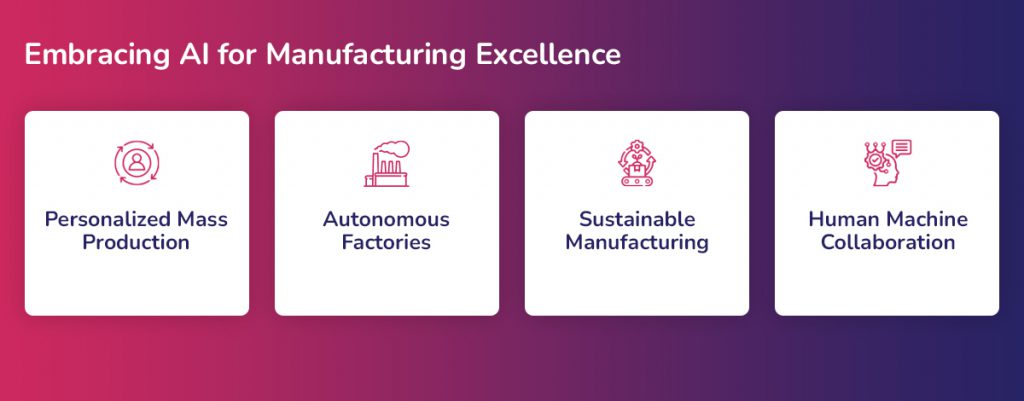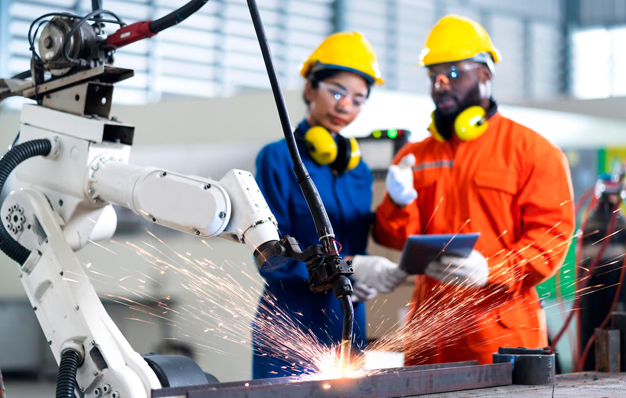The manufacturing industry is undergoing a seismic shift driven by the transformative power of artificial intelligence (AI). Manufacturers are embracing AI to streamline processes, boost efficiency, and gain a competitive edge. This blog delves into the numerous ways AI is reshaping the manufacturing landscape, showcasing real-world examples and their impact on businesses.
The Impact of AI on Manufacturing
A recent Deloitte survey positions manufacturing as the leading industry in data generation. This vast data trove holds immense potential, and AI empowers manufacturers to unlock its value. Furthermore, VentureBeat reports that 26% of organizations are actively leveraging AI for better decision-making, while 66% of manufacturers integrating AI report a growing reliance on this transformative technology. These statistics paint a clear picture: AI adoption in manufacturing is accelerating rapidly.
AI is fundamentally changing the manufacturing environment by:
- Enhancing Productivity and Efficiency: AI-powered predictive maintenance analyzes equipment data to anticipate potential faults, optimizing maintenance schedules and minimizing downtime.
- Revolutionizing Supply Chain Management: Machine learning algorithms streamline logistics, control inventory, estimate demand, and make supply chain management more efficient.
- Improving Decision-Making: AI empowers data-driven decision-making across various aspects of manufacturing operations.
- Guaranteeing Quality: AI-powered quality control systems ensure product consistency with superior accuracy compared to human inspection.
- Optimizing Processes: Real-time process monitoring with AI enables immediate adjustments for maximized efficiency and reduced waste.
A study by PwC highlights how Reinforcement Learning (a subset of AI) can optimize electronic device production by dynamically adjusting machine parameters. This continuous learning and adaptation lead to heightened profitability, minimized defects, and maximized resource utilization.
Use Cases and Examples
The integration of AI in manufacturing is creating a paradigm shift, propelling the industry toward unprecedented advancements:
Supply Chain Management: AI-powered solutions transform supply chain processes by enabling features like predictive analytics, optimized inventory management, enhanced demand forecasting, and streamlined logistics. For instance, Walmart utilizes AI to forecast customer demand, manage inventory levels, and optimize logistics, ensuring product availability and minimizing stockouts.
Cobots: Collaborative robots or cobots work alongside human operators, boosting productivity. These AI-powered cobots handle complex tasks like picking, packing, and intricate assembly processes, seamlessly collaborating with human workers.
Warehouse Management: AI algorithms analyze historical data, current stock levels, and market trends to predict demand patterns accurately, optimizing inventory levels and reducing carrying costs. BMW leverages AI-driven automated guided vehicles (AGVs) to streamline intralogistics operations in their warehouses, enhancing inventory management and visibility.
Assembly Line Optimization: Machine learning algorithms analyze past performance metrics and real-time sensor data to improve workflow, reduce downtime, and enable predictive maintenance. AI-driven computer vision systems identify flaws or anomalies, ensuring product quality. Volkswagen utilizes AI-powered solutions to analyze sensor data from the assembly line, forecast maintenance requirements, and streamline operations.
Predictive Maintenance: AI has revolutionized predictive maintenance. By leveraging advanced analytics and machine learning, companies can proactively monitor and predict equipment failures, minimizing downtime and optimizing maintenance schedules. Ford creates digital twins, virtual replicas of physical assets, to capture real-time data and simulate equipment behavior. This enables AI to analyze patterns, identify anomalies, and predict potential failures.
AI is transforming numerous other aspects of manufacturing:
- New Product Development: AI empowers data-driven decision-making, allowing manufacturers to analyze vast amounts of data to design products aligned with market demands. For example, semiconductor companies utilize machine learning to identify component failures, predict potential issues, and propose optimal layouts for enhanced yield in IC design.
- Performance Optimization: AI algorithms analyze historical data, real-time sensor data, and other relevant variables to identify patterns, detect anomalies, and make data-driven predictions. This empowers manufacturers to optimize operations, minimize downtime, and maximize overall equipment effectiveness. General Electric (GE) integrates AI algorithms to analyze massive volumes of data, identify trends, predict equipment issues, and streamline processes, ultimately boosting overall equipment effectiveness and improving manufacturing efficiency.
- Quality Assurance: AI-powered computer vision systems analyze images or videos of products with exceptional precision, surpassing human capabilities in identifying defects and ensuring adherence to quality standards. Leading electronics manufacturer Foxconn utilizes AI and computer vision to improve quality control procedures, ensuring electronic components meet strict quality standards.
- Streamlined Paperwork: Robotic process automation (RPA) powered by AI automates paperwork processes, minimizing errors and delays. Whirlpool utilizes RPA to automate tasks on the assembly line and for quality control inspections, improving accuracy and efficiency.
- Demand Prediction: AI analyzes historical sales data, market trends, and external factors to predict demand fluctuations, enabling manufacturers to adjust production accordingly and minimize stockouts or excess inventory.

Embracing AI for Manufacturing Excellence
The potential of AI in manufacturing extends far beyond the use cases explored so far. As AI technology continues to evolve, we can expect even more transformative applications to emerge. Here are some exciting possibilities to keep an eye on:
Personalized Mass Production: AI could enable the customization of mass-produced goods, catering to individual customer preferences without sacrificing efficiency.
Autonomous Factories: Highly automated factories with minimal human intervention could become a reality, driven by AI and robotics.
Sustainable Manufacturing: AI-powered solutions can optimize resource utilization, minimize waste, and streamline energy consumption, fostering sustainable manufacturing practices.
Human-Machine Collaboration: The future of manufacturing lies in a harmonious blend of human expertise and AI capabilities. Human workers will focus on high-level tasks like strategy and innovation, while AI handles repetitive and data-driven processes.
How QeDatalab Can Help You Leverage AI
At QeDatalab, we understand the immense potential of AI in revolutionizing manufacturing. We are a leading provider of custom AI solutions specifically designed to address the unique challenges faced by manufacturing businesses. Our team of skilled AI engineers and data scientists can help you:
- Identify AI opportunities within your manufacturing operations.
- Develop and implement custom AI solutions tailored to your specific needs.
- Integrate AI seamlessly with your existing systems and infrastructure.
- Optimize your operations for maximum efficiency and productivity.
We have a proven track record of success in helping manufacturers leverage AI to achieve significant results. Just like how we assisted a global manufacturer of heavy construction and mining equipment by developing a data-driven logistics and supply chain management system using AI-powered RPA, we can customize a solution to propel your business forward.
The manufacturing landscape is rapidly evolving, and AI is at the forefront of this transformation. By embracing AI, manufacturers can gain a significant competitive edge, optimize operations, and unlock new possibilities for growth. Partner with QeDatalab today and embark on your journey towards AI-powered manufacturing excellence.
In Conclusion
AI is not just a buzzword; it’s a transformative force reshaping the manufacturing industry. As AI continues to develop, its impact will only become more profound. By staying informed about the latest advancements and partnering with a trusted AI solutions provider like QeDatalab, manufacturers can unlock the true potential of AI and secure their position in the competitive landscape of tomorrow.




